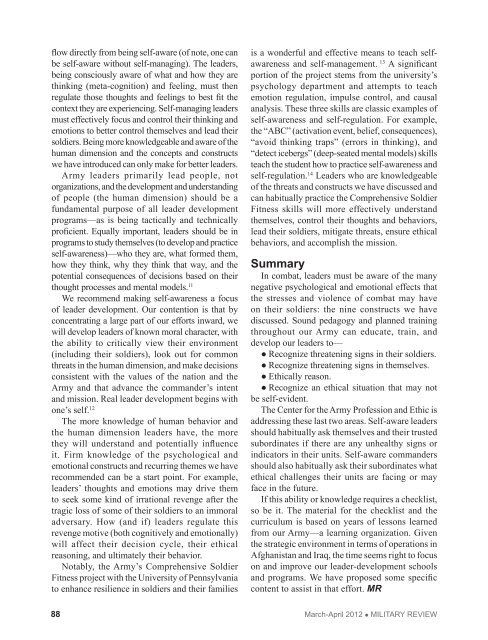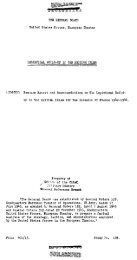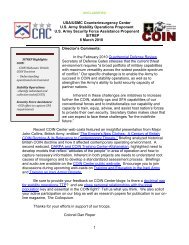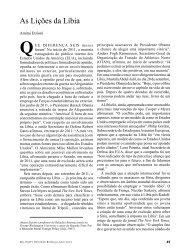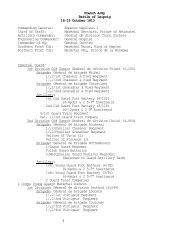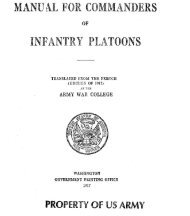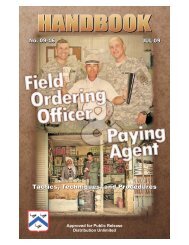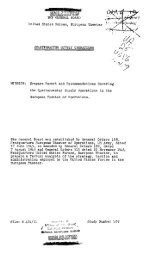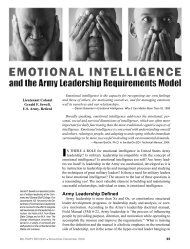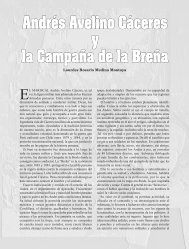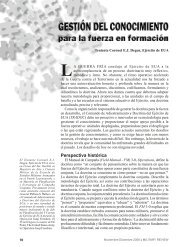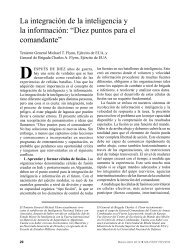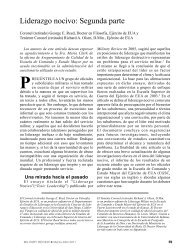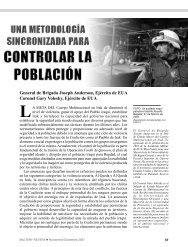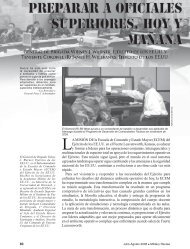Joe Doty - US Army Combined Arms Center and Fort Leavenworth
Joe Doty - US Army Combined Arms Center and Fort Leavenworth
Joe Doty - US Army Combined Arms Center and Fort Leavenworth
You also want an ePaper? Increase the reach of your titles
YUMPU automatically turns print PDFs into web optimized ePapers that Google loves.
flow directly from being self-aware (of note, one can<br />
be self-aware without self-managing). The leaders,<br />
being consciously aware of what <strong>and</strong> how they are<br />
thinking (meta-cognition) <strong>and</strong> feeling, must then<br />
regulate those thoughts <strong>and</strong> feelings to best fit the<br />
context they are experiencing. Self-managing leaders<br />
must effectively focus <strong>and</strong> control their thinking <strong>and</strong><br />
emotions to better control themselves <strong>and</strong> lead their<br />
soldiers. Being more knowledgeable <strong>and</strong> aware of the<br />
human dimension <strong>and</strong> the concepts <strong>and</strong> constructs<br />
we have introduced can only make for better leaders.<br />
<strong>Army</strong> leaders primarily lead people, not<br />
organizations, <strong>and</strong> the development <strong>and</strong> underst<strong>and</strong>ing<br />
of people (the human dimension) should be a<br />
fundamental purpose of all leader development<br />
programs—as is being tactically <strong>and</strong> technically<br />
proficient. Equally important, leaders should be in<br />
programs to study themselves (to develop <strong>and</strong> practice<br />
self-awareness)—who they are, what formed them,<br />
how they think, why they think that way, <strong>and</strong> the<br />
potential consequences of decisions based on their<br />
thought processes <strong>and</strong> mental models. 11<br />
We recommend making self-awareness a focus<br />
of leader development. Our contention is that by<br />
concentrating a large part of our efforts inward, we<br />
will develop leaders of known moral character, with<br />
the ability to critically view their environment<br />
(including their soldiers), look out for common<br />
threats in the human dimension, <strong>and</strong> make decisions<br />
consistent with the values of the nation <strong>and</strong> the<br />
<strong>Army</strong> <strong>and</strong> that advance the comm<strong>and</strong>er’s intent<br />
<strong>and</strong> mission. Real leader development begins with<br />
one’s self. 12<br />
The more knowledge of human behavior <strong>and</strong><br />
the human dimension leaders have, the more<br />
they will underst<strong>and</strong> <strong>and</strong> potentially influence<br />
it. Firm knowledge of the psychological <strong>and</strong><br />
emotional constructs <strong>and</strong> recurring themes we have<br />
recommended can be a start point. For example,<br />
leaders’ thoughts <strong>and</strong> emotions may drive them<br />
to seek some kind of irrational revenge after the<br />
tragic loss of some of their soldiers to an immoral<br />
adversary. How (<strong>and</strong> if) leaders regulate this<br />
revenge motive (both cognitively <strong>and</strong> emotionally)<br />
will affect their decision cycle, their ethical<br />
reasoning, <strong>and</strong> ultimately their behavior.<br />
Notably, the <strong>Army</strong>’s Comprehensive Soldier<br />
Fitness project with the University of Pennsylvania<br />
to enhance resilience in soldiers <strong>and</strong> their families<br />
is a wonderful <strong>and</strong> effective means to teach selfawareness<br />
<strong>and</strong> self-management. 13 A significant<br />
portion of the project stems from the university’s<br />
psychology department <strong>and</strong> attempts to teach<br />
emotion regulation, impulse control, <strong>and</strong> causal<br />
analysis. These three skills are classic examples of<br />
self-awareness <strong>and</strong> self-regulation. For example,<br />
the “ABC” (activation event, belief, consequences),<br />
“avoid thinking traps” (errors in thinking), <strong>and</strong><br />
“detect icebergs” (deep-seated mental models) skills<br />
teach the student how to practice self-awareness <strong>and</strong><br />
self-regulation. 14 Leaders who are knowledgeable<br />
of the threats <strong>and</strong> constructs we have discussed <strong>and</strong><br />
can habitually practice the Comprehensive Soldier<br />
Fitness skills will more effectively underst<strong>and</strong><br />
themselves, control their thoughts <strong>and</strong> behaviors,<br />
lead their soldiers, mitigate threats, ensure ethical<br />
behaviors, <strong>and</strong> accomplish the mission.<br />
Summary<br />
In combat, leaders must be aware of the many<br />
negative psychological <strong>and</strong> emotional effects that<br />
the stresses <strong>and</strong> violence of combat may have<br />
on their soldiers: the nine constructs we have<br />
discussed. Sound pedagogy <strong>and</strong> planned training<br />
throughout our <strong>Army</strong> can educate, train, <strong>and</strong><br />
develop our leaders to—<br />
● Recognize threatening signs in their soldiers.<br />
● Recognize threatening signs in themselves.<br />
● Ethically reason.<br />
● Recognize an ethical situation that may not<br />
be self-evident.<br />
The <strong>Center</strong> for the <strong>Army</strong> Profession <strong>and</strong> Ethic is<br />
addressing these last two areas. Self-aware leaders<br />
should habitually ask themselves <strong>and</strong> their trusted<br />
subordinates if there are any unhealthy signs or<br />
indicators in their units. Self-aware comm<strong>and</strong>ers<br />
should also habitually ask their subordinates what<br />
ethical challenges their units are facing or may<br />
face in the future.<br />
If this ability or knowledge requires a checklist,<br />
so be it. The material for the checklist <strong>and</strong> the<br />
curriculum is based on years of lessons learned<br />
from our <strong>Army</strong>—a learning organization. Given<br />
the strategic environment in terms of operations in<br />
Afghanistan <strong>and</strong> Iraq, the time seems right to focus<br />
on <strong>and</strong> improve our leader-development schools<br />
<strong>and</strong> programs. We have proposed some specific<br />
content to assist in that effort. MR<br />
88 March-April 2012 • MILITARY REVIEW


